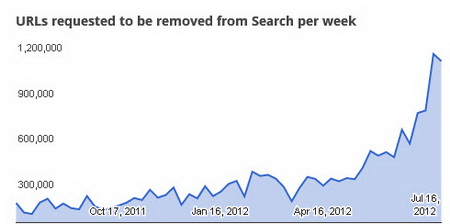Google has announced that it will upgrade its search engine to offer more legal content instead of pirate. This move is a part of Google’s plan to make piracy content ranking lower and boost legal entertainment industry, which has been blaming Google in facilitating piracy.

Photo: Google infographics, from www.google.com/transparencyreport
Google refused to remove illegal websites from its search ranging results saying that it is the matter only the courts can resolve. But starting this week, Google will use a new algorithm that will rank websites based on the number of valid copyright removal notices they receive.
“Starting next week, we will begin taking into account a new signal in our rankings: the number of valid copyright removal notices we receive for any given site. Sites with high numbers of removal notices may appear lower in our results. This ranking change should help users find legitimate, quality sources of content more easily—whether it’s a song previewed on NPR’s music website, a TV show on Hulu or new music streamed from Spotify,” wrote Amit Singhal, Google’s svp of engineering, in a blog post.
But Google is not as simple as it may seem. The company didn’t include several crucial points. It’s Transparency report reads:
“The data below consists of the copyright removal requests we’ve received through our web form for Google Search. It is a partial historical record that includes more than 95% of the copyright removal requests that we have received for Google Search since July 2011” and “Requests for products other than Google Search (e.g, requests directed at YouTube or Blogger) are not included.”
According to Forbes, Google has created a different channel for copyright holders to request material be removed from YouTube—and those requests are not factored into this new channel.
If copyright owners want their data to be taken down from YouTube, they should visit the YouTube Copyright Center first. There, they have an opportunity either submit multiple notifications through its ‘Content Verification Program,’ or leave the material as it is and get a revenue share on the related advertising.